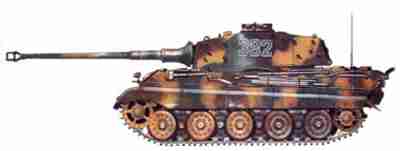Panzerkampfwagen VI Tiger II, SdKfz 182


Armaments Minister Albert Speer began thinking about an even more powerful tank than the
Tiger
and
Panther.
In January 1943, a specification was issued to Porsche and Henschel for
a new heavy tank carrying an 88mm high-velocity gun. The two prototypes, VK.4502 (P) and
VK.4503(H) were available by October. Porsche were so confident in their turret design
that they put it in production. However, Henschel won the competition again and entered
production at the end of December. The first 50 vehicles had the Porsche turret to avoid
waste.
The PzKpfw VI Ausf B, also called Tiger II or Königstiger (King or Royal Tiger) was the
most formidable tank in service until the introduction of the Soviet JS-3 just before the
war's end. It was, however, miserably underpowered because it used the same Maybach HL 230
P45 engine as that in the Tiger I, which was 11 tons lighter! The power-to-weight ration
was extremely poor. Although a maximum road speed of 41.5km/h was achieved during trials,
it was almost certain that the vehicle would break down if it tried to sustain this.
However, by the time the Tiger II entered combat in February 1944 Germany was defending,
and heavy armor and a powerful gun were much more important than mobility.
The Tiger II had extremely thick armor that were also well-sloped, and a long-barrelled
high-velocity 88mm KwK 43 L/71. It was the most powerful German tank of the war, and its
gun enabled it to engage Allied tanks at long ranges. However, its poor maneuverability
made it susceptible to attacks in the flanks or rear. In addition, the Tiger II was just
as vulnerable to aerial attacks by fighter-bombers, and its size made it hard to hide.
Only 487 were produced, and, like many other German weapons in the latter part of the war,
they were too little, too late.
Back to German Tanks Page
Back to Heer Page
Back to Homepage